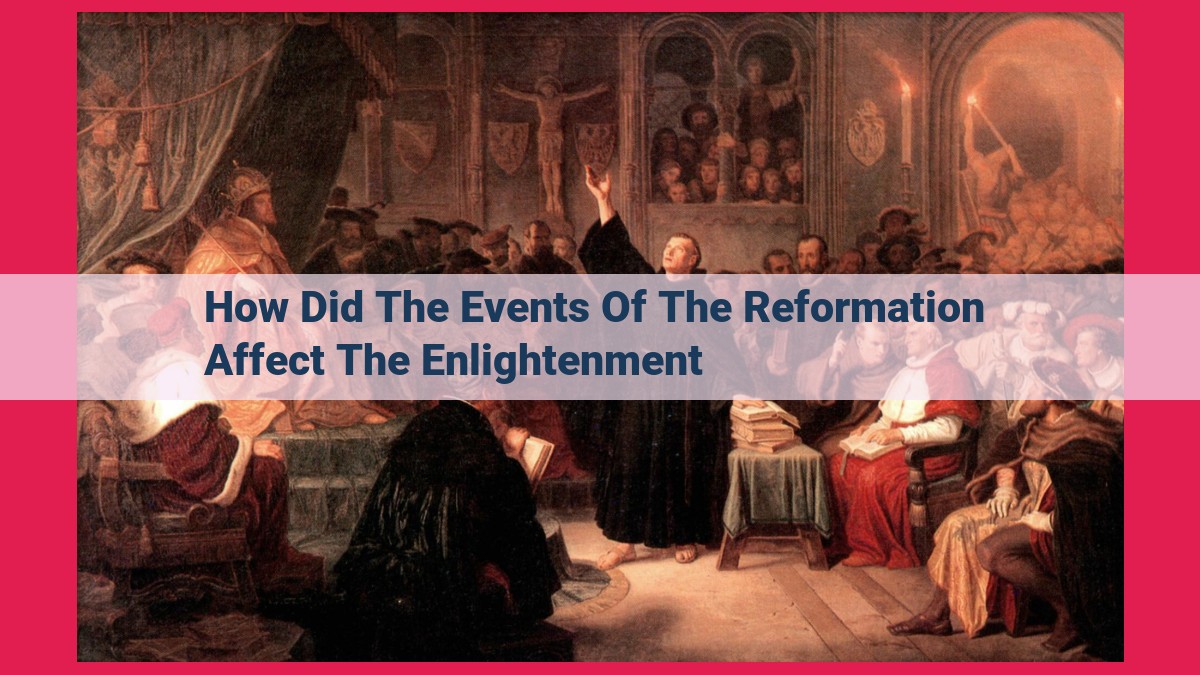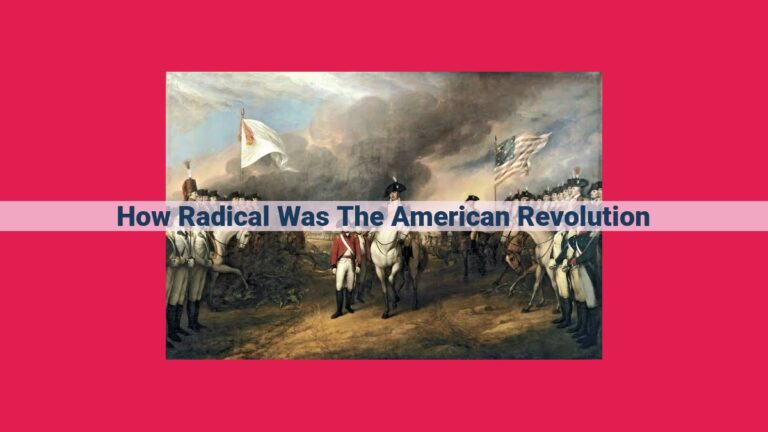The Reformation’s Influence On The Enlightenment: The Birth Of Reason And Dissent

The Reformation’s emphasis on individualism, skepticism, and the questioning of authority paved the way for the Enlightenment’s focus on reason, observation, and the separation of church and state. The rise of nonconformist groups and the challenges they posed to the established Church fostered an atmosphere of intellectual freedom, enabling the Enlightenment’s exploration of new ideas and the questioning of traditional beliefs.
Rise of Individualism: A Departure from Medieval Collectivity
In the tapestry of history, the Middle Ages painted a vibrant canvas where communal bonds held sway. Families, guilds, and religious orders enveloped individuals, shaping their identities and destinies. However, a profound shift began to ripple through society, signaling the dawn of a new era: the Enlightenment.
During this intellectual awakening, a radiant spotlight was cast upon the individual. This seismic change marked a departure from the medieval emphasis on collective identity. People began to value their unique qualities and aspirations, asserting their own voices and forging their own paths.
This burgeoning individualism found expression in a newfound celebration of human potential. Individuals were no longer mere cogs in a societal machine but rather vibrant and autonomous beings, capable of reason, creativity, and self-expression.
The rise of individualism had far-reaching implications. It fostered a spirit of innovation and exploration, as people were no longer bound by the constraints of tradition or the dictates of the collective. This surge of intellectual liberation set the stage for groundbreaking discoveries and transformations across various fields of thought and human endeavor.
The Enlightenment’s Enduring Legacy of Rationalism and Reason
The Enlightenment, a period of intellectual awakening that swept across Europe in the 17th and 18th centuries, ushered in a profound shift in human thought and understanding. At the heart of this transformation lay the Enlightenment’s emphasis on reason as the primary source of knowledge and authority.
Challenging Traditional Authority
Prior to the Enlightenment, society had long relied on religious dogma and tradition as the foundation for knowledge and truth. However, Enlightenment thinkers dared to question these established authorities. They argued that reason and observation should guide human understanding, not blind faith.
The Triumph of Reason
Rejecting the authority of the Church and other traditional institutions, Enlightenment thinkers such as René Descartes and John Locke exalted the power of reason. They believed that through rational inquiry and logical analysis, humans could uncover the underlying principles of the natural world and human society.
The Scientific Method and Empirical Evidence
This emphasis on reason manifested itself in the development of the scientific method, which emphasized observation, experimentation, and empirical evidence. By relying on scientific inquiry rather than preconceived notions, Enlightenment thinkers paved the way for groundbreaking discoveries in fields such as physics, astronomy, and medicine.
Enlightenment’s Lasting Impact
The Enlightenment’s unwavering belief in reason has left an indelible mark on our world. It laid the foundation for the development of modern science, technology, and the scientific method. It also inspired the American and French Revolutions, which emphasized ideals of liberty, equality, and the rule of law.
Relevance in Contemporary Discourse
Even today, the Enlightenment’s legacy of rationalism and reason continues to resonate in contemporary debates. From discussions on climate change to the rise of misinformation, the Enlightenment’s principles of critical thinking and the pursuit of evidence-based knowledge remain essential to navigating the complexities of the modern world.
The Enlightenment’s enduring legacy of rationalism and reason is a testament to the transformative power of intellectual inquiry. By challenging traditional authority, embracing reason, and emphasizing empirical evidence, Enlightenment thinkers laid the foundation for a more enlightened and progressive society. Their ideals continue to guide us as we navigate the challenges and opportunities of the 21st century.
Empiricism and Observation: Highlight the importance of observation and experimentation as a means to gain knowledge.
Empiricism and Observation: The Bedrock of Enlightenment Knowledge
In the heart of the Enlightenment, a profound shift occurred in the pursuit of knowledge. Empiricism, a cornerstone of this intellectual movement, emphasized the importance of observation and experimentation as the primary means to unravel the mysteries of the world.
Before the Enlightenment, traditional knowledge was often derived from ancient texts or religious dogma. However, Enlightenment thinkers dared to break from these established norms. They believed that knowledge could not simply be inherited but must be actively sought through direct experience.
Observation became the vigilant eye that scrutinized the world. By paying meticulous attention to their surroundings, Enlightenment thinkers sought patterns, connections, and causal relationships. Experimentation was the crucible where theories met reality. They conducted controlled experiments to test their hypotheses and verify or refute their findings.
Francis Bacon, a pioneer of empiricism, argued that true knowledge comes from the diligent collection of data and the subsequent inductive reasoning. By examining individual observations, one could gradually ascend to broader generalizations and establish scientific laws.
John Locke, another influential empiricist, asserted that all knowledge is ultimately derived from sensory experience. He believed that the mind is a blank slate (tabula rasa) at birth, and knowledge is inscribed upon it through our interactions with the world.
The emphasis on empiricism had a profound impact on scientific inquiry. It led to the development of new methods of investigation, such as controlled experiments and data analysis. Scientists could now test their ideas against the evidence of the natural world, leading to groundbreaking discoveries in physics, astronomy, and biology.
The legacy of empiricism extends far beyond the Enlightenment. Modern science continues to rely heavily on observation and experimentation to acquire and verify knowledge. Moreover, the principle of empirical inquiry has become an essential part of our critical thinking toolkit, helping us to distinguish between fact and fiction, truth and falsehood.
Skepticism and Authority: Questioning the Established Order
Skepticism and the Enlightenment
The Enlightenment was a transformative period characterized by a profound shift in intellectual attitudes. Skepticism, the philosophical practice of questioning established beliefs and doubting claims of authority, played a pivotal role in this transformation. It was a critical tool for challenging traditional doctrines and paving the way for a more rational and evidence-based approach to knowledge.
Challenging the Church’s Dominance
During the medieval period, religious institutions held immense power, dictating not only spiritual matters but also intellectual inquiry. The Church’s authority rested on the assumption of divine revelation, and its teachings were considered absolute truth. However, Enlightenment thinkers began to question this authority, arguing that human reason should be the ultimate arbiter of truth. René Descartes, a pioneer of skeptical philosophy, famously postulated, “I think, therefore I am.” This statement emphasized the primacy of individual consciousness and raised doubts about the external world’s certainty.
Empiricism and Observation
Empiricism, the philosophical doctrine that emphasizes the importance of observation and experimentation, further fueled skepticism towards established authorities. Enlightenment thinkers such as John Locke and Francis Bacon argued that knowledge could only be acquired through sensory experience and that “there is nothing in the intellect that was not first in the senses.” This empirical approach demanded proof and tangible evidence, weakening the influence of authority and hearsay.
The Rise of Critical Thinking
Skepticism fostered a culture of critical thinking and intellectual inquiry. It encouraged individuals to question assumptions, examine arguments, and seek evidence to support claims. This critical approach undermined the authority of tradition and allowed for a more nuanced understanding of the world. It also laid the foundation for the scientific revolution, where experimental methods and empirical observations replaced dogmatic beliefs.
Legacy of Skepticism
The Enlightenment’s skeptical spirit continues to resonate in contemporary society. It has fostered a healthy skepticism towards authority and a willingness to question established norms. Skepticism empowers us to think independently, evaluate information critically, and make informed decisions. It remains a vital ingredient for a thriving, intellectually stimulating society.
Toleration and Diverse Beliefs: The Enlightenment’s Embrace of Pluralism
In the heart of the Enlightenment, a torch of tolerance was ignited, casting a bright glow upon the dim landscape of religious and political conformity. Reason and human empathy became the guiding lights, challenging the narrow confines of dogma and prejudice.
The Enlightenment’s philosophers recognized that diversity of beliefs was not a threat to society, but rather a source of enlightenment. They argued for the acceptance of different religious and political views, recognizing that no single creed held a monopoly on truth.
Thinkers such as John Locke and Voltaire penned eloquent defenses of religious pluralism, urging for the separation of church and state and the right to freedom of conscience. They believed that tolerance was not merely an ideal, but a necessity for a harmonious society.
Stories emerged of individuals who dared to defy religious orthodoxy, risking persecution and even death for their beliefs. These stories served as powerful reminders of the preciousness of individual conscience.
The Enlightenment’s embrace of tolerance laid the foundation for modern conceptions of liberty and human rights. It fostered an atmosphere of intellectual freedom and scientific inquiry, where new ideas could flourish and challenge established norms.
To this day, the Enlightenment’s legacy of tolerance remains vital in our diverse and interconnected world. It reminds us that open-mindedness, empathy, and respect for differing perspectives are essential for creating a just and harmonious society.
Religious Pluralism and Nonconformism: A Challenge to the Established Church
During the dawn of the Enlightenment, the religious landscape underwent a seismic shift. The Reformation had shattered the monolithic authority of the Catholic Church, giving rise to a multitude of nonconformist groups. These breakaway factions, emboldened by the spirit of individualism and skepticism, posed formidable challenges to the established Church.
Questioning Authority and Dogma:
Nonconformist movements, such as the Puritans, Baptists, and Quakers, rejected the dogma of the established Church. They dared to question its teachings and practices, believing that personal interpretation of scripture held greater sway than the dictates of religious authorities.
The Rise of Dissenters:
As these nonconformist groups proliferated, they faced persecution and marginalization. Yet, their resolve remained unshaken. They organized underground meetings and established their own places of worship, all the while challenging the legitimacy of the dominant religion.
Tension and Conflict:
The rise of nonconformism created a climate of religious tension and conflict. The established Church, fearing its dwindling influence, retaliated with repressive measures. Nonconformists were imprisoned, fined, and even executed.
Tolerance and Freedom of Worship:
Despite the persecution, the Enlightenment’s ideals of tolerance and freedom of belief gradually gained traction. Over time, nonconformist groups fought for and eventually achieved legal recognition. This shift marked a turning point in Western society, as it paved the way for greater religious pluralism and the separation of church and state.
The Lasting Impact:
The rise of nonconformism during the Enlightenment left an indelible mark on Western history. It not only challenged religious authority but also fostered an environment of intellectual inquiry and respect for diverse beliefs. These ideals continue to resonate in contemporary society, shaping our understanding of religious liberty and the importance of challenging established norms.
The Scientific Revolution: Clashing with the Church’s Authority
During the transformative era of the Enlightenment, the scientific revolution emerged as a formidable force, challenging the long-held authority of the Church. As scientists embarked on their intrepid explorations of the natural world, their discoveries clashed with the established theological doctrines, igniting a period of intense tension and debate.
Unraveling the Cosmos: A Threat to Divine Order
The 16th and 17th centuries witnessed a surge in scientific inquiry that questioned the Church’s geocentric model of the universe. Nicolaus Copernicus and Galileo Galilei proposed the heliocentric model, asserting that the planets revolved around the Sun, not the Earth. These radical ideas challenged the Church’s teachings, which portrayed humans as the center of creation.
Church’s Response: Retaliation and Resistance
The Church vehemently opposed these scientific revelations, viewing them as heretical threats to its authority. Pope Urban VIII condemned Galileo’s heliocentric theory, and the Vatican placed his writings on the Index of Forbidden Books. The Church’s resistance stemmed from a fear that questioning its cosmological beliefs would undermine its religious teachings and erode its spiritual authority.
A Battle of Ideas: Science vs. Faith
The confrontation between science and the Church became a battle of ideologies. Scientists advocated for rationalism and empiricism, emphasizing the importance of observation and experimentation in gaining knowledge. The Church, on the other hand, clung to faith and revelation as the primary sources of truth.
A Gradual Shift: Science Ascendant
Despite the Church’s initial resistance, the scientific revolution ultimately gained momentum. Scientists continued to make groundbreaking discoveries, and the public’s trust in scientific methods grew. Over time, the Church gradually accepted the scientific worldview, realizing that it could coexist with its religious teachings.
Legacy of the Conflict: A Divided Impact
The clash between the scientific revolution and the Church left a lasting legacy. It sparked a healthy tension between faith and reason, encouraging continued scientific exploration while preserving the importance of spiritual belief. However, the conflict also sowed seeds of disenchantment with the Church, eroding its authority in some spheres and contributing to the secularization of Western society.
In conclusion, the scientific revolution profoundly challenged the authority of the Church, setting in motion a complex interplay between science and faith. While the initial clash created discord, it ultimately led to a more nuanced understanding of the relationship between the two, shaping the intellectual and spiritual landscape of the Enlightenment and beyond.
Separation of Church and State: Explain the gradual process of separating religious and political institutions, leading to the establishment of secular governance.
The Genesis of Church-State Separation: A Journey Towards Secular Governance
The Medieval Tapestry: A Symbiotic Relationship
For centuries, the Church and the State were intertwined, like threads in an intricate tapestry. Religious institutions held sway over both spiritual and temporal realms, their authority woven into the fabric of society. But as the Enlightenment dawned, this tapestry began to unravel, heralding a gradual shift towards church-state separation.
Reformation’s Disruptive Force
The Reformation sowed the seeds of dissent, giving rise to nonconformist groups who challenged the established Church’s authority. Martin Luther’s Ninety-Five Theses kindled the flames of religious pluralism, opening up a Pandora’s box of theological perspectives.
The Scientific Revolution: A Clash of Paradigms
Concurrent with the Reformation, the Scientific Revolution shattered the Church’s grip on knowledge. Scientists like Galileo Galilei dared to question dogma, relying on observation and empiricism to unlock the secrets of the universe. This shift in epistemology further eroded the Church’s authority, creating a chasm between faith and reason.
Enlightenment’s Spark: Individualism and Reason
The Enlightenment fanned the flames of individualism, emphasizing the inherent worth of every human being. Reason, once overshadowed by divine revelation, became the guiding star of truth and progress. Skepticism permeated intellectual circles, as philosophers questioned established norms and sought evidence-based explanations.
Gradual Separation: A Balancing Act
The separation of Church and State was not an abrupt event but a gradual process, fraught with tension and conflict. Statesmen and theologians alike grappled with the complexities of reconciling religious freedom with political stability.
America’s Bold Experiment
Across the Atlantic, the fledgling United States of America became a beacon of church-state separation. The First Amendment enshrined the principle of religious freedom, prohibiting the government from establishing a state religion. This radical experiment became a model for other nations seeking to disentangle the spheres of spirituality and governance.
A Legacy of Tolerance and Secularism
Today, the legacy of church-state separation continues to shape societies worldwide. Tolerance and religious pluralism have replaced theocratic rule, while secularism has become a cornerstone of modern democratic institutions.
Relevance in Modern Discourse
Even in the 21st century, the Enlightenment’s ideals of reason, tolerance, and individualism resonate deeply in contemporary debates. From the separation of Church and State in emerging democracies to the protection of religious minorities in pluralistic societies, the Enlightenment’s transformative principles continue to guide our navigation of the complexities of religious and political life.
Humanism and the Renaissance: Seeds of Enlightenment Thought
The Enlightenment, a period of intellectual and cultural awakening in Europe, drew inspiration from the humanistic ideals that flourished during the Renaissance. The Renaissance celebrated individualism, emphasized reason, and nurtured an appreciation for classical learning.
One of the key figures of the Renaissance was Francesco Petrarch, who argued that humans possessed the power of reason and could achieve greatness through education and introspection. This humanistic perspective challenged the medieval emphasis on divine authority and laid the groundwork for the Enlightenment’s rationalist approach to knowledge.
The Renaissance also witnessed the rediscovery of classical texts, including works by Greek philosophers such as Plato and Aristotle. These texts inspired thinkers to question established beliefs and seek truth through empirical observation and rational inquiry.
Moreover, the Renaissance promoted the arts and literature, which became vehicles for expressing humanistic ideals. Works of art and literature depicted human achievements, celebrated reason, and questioned traditional values.
Thus, the humanistic spirit of the Renaissance provided fertile ground for the seeds of Enlightenment thought. It fostered an environment of intellectual freedom, rational inquiry, and individual expression, setting the stage for the profound intellectual transformation that characterized the Enlightenment.
Religious Pluralism and Reformation: A Catalyst for Intellectual Freedom
Amidst the transformative era of the Enlightenment, religious pluralism and the Protestant Reformation played a pivotal role in fostering an atmosphere of intellectual freedom.
During the medieval era, the Catholic Church held sway over every aspect of society, dictating religious beliefs and suppressing dissenting voices. However, as humanism and rationalism gained prominence, people began to question the authority of the Church.
The Reformation, spearheaded by figures like Martin Luther and John Calvin, challenged the Church’s monopoly on religious truth and sparked a wave of religious pluralism. Different Protestant denominations emerged, each with its distinct interpretations of scripture. This diversity of beliefs opened the door to intellectual inquiry and debate.
The challenge to Church authority extended beyond religious matters. The Reformation’s emphasis on individual conscience and direct access to the Bible fostered a spirit of critical thinking and personal responsibility. People began to question not only religious dogma but also political and social norms.
This atmosphere of intellectual freedom provided a fertile ground for the Enlightenment’s emphasis on reason and empiricism. The Protestant emphasis on scriptural interpretation encouraged individuals to analyze and question religious texts, while the Reformation’s break from Catholic authority severed the shackles of dogma. As a result, people felt empowered to explore new ideas and challenge established norms, paving the way for the intellectual revolution of the Enlightenment.
The Scientific Revolution: A Catalyst for Enlightenment’s Rise
The dawn of the Scientific Revolution marked a profound turning point in human history. Scientific discoveries shattered long-held dogma and paved the way for a new era of reason and intellectual freedom. This revolution had a profound impact on the Enlightenment, a period marked by the ascendance of rationalism and the questioning of tradition.
A Challenge to Established Authority:
The scientific method, with its emphasis on observation and experimentation, challenged the authority of the Church and the prevailing Aristotelian worldview. Scientists questioned the established beliefs of the time, conducting experiments to verify and falsify hypotheses. This spirit of inquiry and skepticism became a hallmark of the Enlightenment.
A Shift in Perspective:
The Scientific Revolution shifted the focus away from divine revelation and towards empirical evidence. This led to a new understanding of the natural world, with scientists replacing religious figures as the trusted authorities. The emphasis on reason and logical thinking created a fertile ground for intellectual exploration.
The Rise of Reason and Rationalism:
Reason became the primary guide for understanding the world during the Enlightenment. Philosophers and scientists argued that all knowledge should be based on logical reasoning and empirical evidence. This shift in perspective further eroded the influence of tradition and superstition, paving the way for a more rational and secular society.
The Scientific Revolution was a catalyst for the Enlightenment’s emphasis on reason and the questioning of tradition. It shattered dogma, gave rise to a new spirit of inquiry, and shifted the focus from faith to empirical knowledge. This intellectual transformation laid the foundation for the Enlightenment, an era that forever changed the course of human thought and shaped the modern world.
Skepticism and Empiricism: The Cornerstones of Enlightenment Thought
The Enlightenment, a pivotal era characterized by _intellectual revolution_, shook the foundations of traditional beliefs and ushered in a new age of _reason and rational inquiry_. At its core, the Enlightenment was fueled by two driving forces: _skepticism and empiricism_.
Skepticism planted seeds of doubt in the minds of Enlightenment thinkers. They questioned established truths, challenged dogma, and refused to accept knowledge based solely on faith or tradition. This spirit of inquiry led them to explore new ways of understanding the world, free from the shackles of blind acceptance.
Empiricism, its steadfast companion, emphasized the importance of observable facts and experimentation. Enlightenment thinkers believed that true knowledge could only be acquired through direct observation and rigorous scientific methods. They rejected abstract theories and relied on _evidence-based reasoning_ to unravel the mysteries of the natural world.
Together, _skepticism and empiricism_ formed the epistemological foundation of the Enlightenment. They shattered outdated notions of knowledge and paved the way for a new era of intellectual exploration and scientific advancement. Their legacy continues to shape our modern understanding of the world, emphasizing the power of critical thinking, evidence-based reasoning, and the pursuit of knowledge through observation and experimentation.
Toleration and Individualism: Explain how toleration and individualism fostered the exchange of ideas and intellectual progress.
Toleration and Individualism: Fostering Enlightenment’s Intellectual Adventure
Amidst the intellectual ferment of the Enlightenment, the virtues of tolerance and individualism became the catalysts for an unprecedented exchange of ideas. In an era marked by religious strife and political absolutism, these ideals provided a much-needed sanctuary for free thought and creative expression.
The Reformation had shattered the monolithic grip of the medieval Church, ushering in an era of religious pluralism. As people encountered diverse beliefs and practices, the concept of tolerance took hold. It was no longer acceptable to suppress or persecute individuals solely based on their religious convictions.
This spirit of tolerance extended beyond the realm of religion. Enlightenment thinkers recognized the inherent worth of each individual, regardless of their social status or origin. The notion of individualism gained prominence, emphasizing the importance of personal rights and the pursuit of individual happiness.
As tolerance and individualism flourished, so too did intellectual progress. The exchange of ideas between diverse perspectives fostered a vibrant and stimulating atmosphere. Thinkers from across Europe gathered in salons and coffeehouses, sharing their thoughts and insights.
This open and inclusive environment allowed for the germination of new theories and discoveries. Scientific breakthroughs were made as rationalism and empiricism became the guiding principles of knowledge acquisition. Artists and writers embraced individualism, exploring new forms of expression and challenging societal norms.
The Enlightenment’s legacy of tolerance and individualism has had a profound impact on contemporary society. It has paved the way for the modern concept of human rights and laid the foundation for democratic principles. These ideals continue to shape our conversations about free speech, religious freedom, and the pursuit of individual fulfillment.
In an increasingly interconnected and diverse world, the Enlightenment’s emphasis on tolerance and individualism remains as relevant as ever. By embracing these virtues, we foster a society where different perspectives can coexist, where creativity flourishes, and where every individual has the opportunity to reach their full potential.
Political Philosophy: Discuss the influence of Enlightenment ideas on the development of political philosophy, including concepts such as natural rights and representative government.
Political Philosophy: The Enlightenment’s Enduring Legacy
The Enlightenment, a pivotal era of intellectual and social transformation, left an indelible mark on political philosophy. Its profound ideas ignited a revolutionary shift in how societies conceived of government and the relationship between citizens and the state.
At the heart of Enlightenment political philosophy lay the notion of natural rights — inherent, inalienable rights possessed by every individual by virtue of their humanity. These rights, encompassing life, liberty, and the pursuit of happiness, became the cornerstone of modern constitutions and legal systems.
Another fundamental principle championed by Enlightenment thinkers was that of representative government. They argued that governments should be accountable to the people they govern. This led to the development of democratic systems, where citizens elect representatives to voice their interests and make decisions on their behalf.
The Enlightenment’s emphasis on reason and rationality also shaped the evolution of political thought. Philosophers like Locke and Montesquieu espoused the idea of a social contract, whereby citizens willingly surrender some of their freedoms in exchange for protection and order provided by the state. This contractual approach provided a theoretical framework for understanding the relationship between individuals and government.
The Enlightenment’s political legacy continues to resonate profoundly today. Its emphasis on individual rights, representative government, and rational decision-making has shaped the foundations of modern democracies and our ongoing debates about the nature of governance and the rights and responsibilities of citizens.
Scientific Method and Rationalism: Explain the legacy of the Enlightenment’s emphasis on scientific method, rationality, and the pursuit of knowledge.
Scientific Method and Rationalism: The Enlightenment’s Legacy of Knowledge-Seeking
The Enlightenment, a time of profound intellectual awakening, left an indelible mark on the way we pursue knowledge and navigate the world. At the core of this movement lay the emphasis on scientific method and rationalism, which transformed our understanding of nature, society, and ourselves.
The Scientific Method: A Journey of Inquiry
One of the key contributions of the Enlightenment was the development of the scientific method, a systematic approach to exploring and understanding the natural world. This method involved:
- Observation: Documenting and gathering data on phenomena.
- Hypothesis Formation: Proposing possible explanations based on the observations.
- Experimentation: Testing the hypotheses through controlled experiments.
- Analysis and Conclusion: Interpreting the results and drawing conclusions about the phenomena.
This rigorous approach to knowledge-seeking replaced the reliance on dogma and superstition that had characterized earlier eras. By emphasizing controlled experimentation and evidence-based reasoning, the scientific method ushered in a new era of scientific discovery and understanding.
Rationalism: The Power of Reason
Closely intertwined with the scientific method was the concept of rationalism. Enlightenment thinkers believed that reason was the primary source of knowledge and that the human mind had the innate capacity to discern truth and solve problems.
This emphasis on reason led to a shift away from traditional beliefs and authority figures. Enlightenment philosophers encouraged critical thinking, skepticism, and the questioning of established norms. They believed that through the power of reason, individuals could unravel the mysteries of the universe and improve their lives.
Pursuit of Knowledge: A Boundless Endeavor
The Enlightenment’s emphasis on scientific method and rationalism not only revolutionized the way we acquire knowledge but also ignited an unyielding thirst for it. Scholars and intellectuals embraced the pursuit of knowledge as a lifelong endeavor, dedicating themselves to the exploration of all aspects of human experience and the natural world.
This pursuit of knowledge extended beyond the confines of academia into society as a whole. Libraries, salons, and coffeehouses became hubs for intellectual exchange and debate, where ideas were shared, challenged, and refined. The Enlightenment laid the foundation for a knowledge-based society that continues to thrive today.
The Enlightenment’s emphasis on scientific method and rationalism left an enduring legacy on our understanding of the world. The scientific method provides a rigorous framework for scientific inquiry, while rationalism empowers us to question, explore, and seek knowledge. Together, these principles have fueled countless discoveries and innovations, shaping our lives in countless ways. The Enlightenment’s commitment to knowledge-seeking remains a vital force in contemporary society, reminding us of the power of reason and the endless possibilities of human inquiry.
The Enlightenment’s Profound Impact on Arts, Literature, and Society
The Enlightenment, with its emphasis on reason, individualism, and tolerance, sparked a transformative era that profoundly influenced the arts, literature, and social norms.
In the realm of arts, the Enlightenment fostered an appreciation for classical principles of balance, harmony, and rationality. Artists sought to depict the human form and nature with scientific accuracy, as exemplified in the works of painters like Jacques-Louis David and sculptors like Antonio Canova.
Literature experienced a resurgence of realism and satire. Writers like Voltaire, Daniel Defoe, and Jonathan Swift employed their pens to challenge social conventions, political authority, and religious dogma. The novel, as a genre, emerged as a powerful medium for exploring the complexities of human nature and society.
Beyond the arts, the Enlightenment also shaped social norms. Empiricism and rationalism led to a questioning of traditional beliefs and practices. Salons, or gathering places for intellectuals, became hubs for lively debate and the exchange of ideas. Education was recognized as essential for fostering an informed citizenry, and efforts were made to expand access to knowledge.
Women’s roles in society also underwent scrutiny. Intellectual women like Mary Wollstonecraft and Olympe de Gouges advocated for equal rights and opportunities. Their writings sparked a dialogue about the limitations imposed on women and paved the way for future feminist movements.
Overall, the Enlightenment’s ideals permeated all aspects of cultural expression. Art, literature, and social norms were profoundly shaped by the rationalism, individualism, and tolerance that defined that transformative era. Its legacy continues to inspire and challenge us today, reminding us of the importance of reason, open-mindedness, and the pursuit of knowledge.
Religious Pluralism and Humanism: The Legacy of the Enlightenment
The Enlightenment era marked a profound transformation in human thought and society, characterized by a profound shift away from the religious dogmatism and superstition that had dominated the medieval period. At its core, this transformation was fueled by the twin pillars of religious pluralism and humanism.
Religious Pluralism: A Challenge to Traditional Authority
The rise of nonconformist groups during the Reformation challenged the authority of the established Church, creating an atmosphere of intellectual freedom. This pluralism fostered the idea that religious beliefs and practices were subjective and personal, rather than absolute truths imposed by a singular authority. The Enlightenment embraced this diversity, promoting tolerance and acceptance of different religious views.
Humanism: The Centrality of the Individual
Humanism emerged as a powerful force alongside religious pluralism, emphasizing the inherent dignity and worth of every individual. Humanists believed that rationality and reason should guide human affairs, rather than blindly accepting tradition or superstition. This focus on the individual led to a profound shift in societal values, fostering individualism, autonomy, and a belief in the power of human potential.
The Enduring Legacy of Religious Pluralism and Humanism
The Enlightenment’s embrace of religious pluralism and humanism has left an indelible mark on modern society. These principles have become cornerstones of Western civilization, shaping our political, social, and cultural institutions. Religious pluralism ensures that every individual has the freedom to practice their faith without fear of persecution, while humanism promotes compassion, understanding, and a belief in the ability of human beings to shape their own destiny.
In contemporary discourse, the values of religious pluralism and humanism remain vital. They serve as a bulwark against intolerance, discrimination, and attempts to impose a single ideology on society. As we navigate the challenges of the 21st century, these principles continue to provide a guiding light, reminding us that reason, tolerance, and respect for human dignity are essential for creating a just and harmonious world.
Relevance in Contemporary Discourse: Conclude with the relevance of Enlightenment ideals, such as reason, tolerance, and individualism, in contemporary debates and society.
The Enduring Legacy: Enlightenment Ideals in the Modern World
The Enlightenment, a transformative period of intellectual and social upheaval, has left an indelible mark on human civilization. Its core principles of reason, tolerance, and individualism continue to resonate deeply in our contemporary world.
Reason and Critical Thinking
The Enlightenment’s emphasis on rationality has fostered a culture of critical thinking. Today, we embrace the scientific method as a means of gaining knowledge and understanding the world around us. We question dogma and seek evidence to support our beliefs, fostering an atmosphere of intellectual inquiry.
Tolerance and Pluralism
The Enlightenment fostered a spirit of tolerance towards diverse beliefs and opinions. This principle has shaped modern societies that value freedom of expression, religious pluralism, and the acceptance of different lifestyles. It serves as a bulwark against extremism and intolerance.
Individualism and Self-Expression
The Enlightenment celebrated the uniqueness and dignity of the individual. This idea has empowered countless people to pursue their passions, aspirations, and personal fulfillment. It underlies our value of self-reliance and the pursuit of individual rights.
Relevance in Contemporary Debates
In the midst of today’s complex societal issues, Enlightenment ideals provide a guiding light. They remind us of the importance of:
- Rational discourse: Engaging in respectful dialogue, even when viewpoints differ.
- Tolerance of dissent: Accepting the right of others to hold different opinions.
- Individual autonomy: Empowering citizens to make choices that affect their own lives.
- Human rights: Protecting the fundamental freedoms and dignity of all individuals.
The legacy of the Enlightenment continues to shape our world in profound ways. Its ideals of reason, tolerance, and individualism serve as a foundation for modern society. By embracing these principles, we can create a world that is more just, equitable, and humane. As we navigate the challenges of the present, the Enlightenment’s enduring spirit reminds us of the power of reason, empathy, and the indomitable human spirit.





